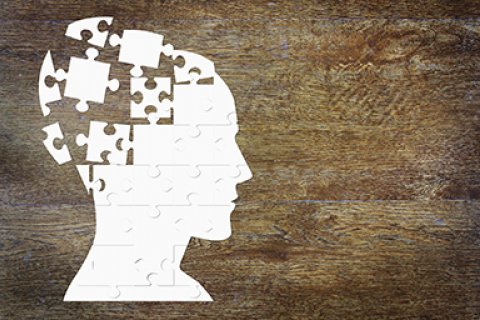Diabolical dilemma: deaf or blind?
Kayleigh Kennedy on her sensory research
We all asked ourselves this at one point in time: if you really have to choose, would you rather be deaf or blind? Master's student of Neuropsychology Kayleigh Kennedy devotes her intern research to it. She looks at ages too. What would you choose as a child, and does your choice change as you get older?

Kayleigh Kennedy carries out her research under the supervision of Professor Dr Albert Postma, Professor of Clinical Neuropsychology. Kayleigh: “Simply put, my research question is: would people rather be deaf or blind? I investigate whether or not there is a connection between the conscious choice between deafness or blindness and your unconscious preference, or sensory dominance: are you primarily auditory or visually focused?”
Her suspicion? “I think you want to hold on to what you perform best in. Say you're stronger visually, I think you'd rather be deaf.” Of course, this ‘rather’ is relative: “How often I've been told: ‘I don't want either.’ This goes for everyone, of course, me included. But if I had to, I would choose deafness.”
CARROT, CORN AND ONION
Kayleigh went to the University Museum Utrecht with auditive and visual tests. A varied group of museum visitors aged between 6 and 81 years were shown rows with three words: “They had to picture the words and encircle the odd one out. The visual test had ‘carrot, corncob and onion’. One didn't fit in in terms of shape, the onion in this case. In the auditive test, the participants had to point out which item stands out because of the sound it makes.” Kayleigh uses the standardised scores of both tests as a guideline: is your brain more focused on hearing or seeing?

She also gave people a questionnaire on which they could indicate their own conscious choices between deafness or blindness. There were also social and societal questions as well as personal questions with which they could explain their choices. Kayleigh: “The human brain has to make decisions and considerations all the time. Some of those are conscious, such as: ‘I could no longer do my work properly if I were blind, so I choose deafness.’ Other factors may be more unconscious. For instance, someone with a relatively strong auditory system may choose blindness without being aware that this is tied to the quality of their hearing.”
Kayleigh’s approach is modernizing because she combines social and neurological research: “You can come up with all kinds or reasons for why you think a certain way about deafness or blindness, but the principle of neuropsychology is: behaviour comes from the brain. How do unconscious processes influence your conscious choices and answers to such a questionnaire?”
LEARN YOUNG, LEARN FAIR?
She is currently analysing her results, but Kayleigh already noticed a trend during the testing phase: “Most people choose deafness. And I noticed that people who would rather be blind were often, for instance, musicians.” She made a good dispersion between the various age categories: “An important question in my research is: does your choice change as you age? The younger you start, the better. You can learn a lot from exactly that development. You can, for instance, intervene if there are problems if you know how the relationship between the brain and behaviour works.”

In any case, it is clear that there are differences between the age groups: “We're currently analysing what causes these differences. For children and youngsters, the trend is with deafness anyway. They would prefer to retain their sight. And I also see that children don't change their opinions. They know immediately!” She had an altered questionnaire for young children: “I liked seeing what they thought about this. One of the questions was: do you think blind people can be helped well? A number of children gave the same answer: ‘Yes, because they can get a doggy!’”
Still, many children thought blindness would have a bigger impact on their lives than deafness: “They'd say: 'My family would learn sign language for me.' Many adults turn out to fear the practical objections to blindness as well. Driving, doing your job, they think they couldn't function if they were blind.”
THE BOUNDARIES OF OUR POWERS OF IMAGINATION
Even though deafness has big consequences too, when you think about it: “One of my uncles is deaf and afraid to drive, because he's afraid he can't understand the police officer if he gets pulled over. I had never thought of that before. Now you know how bad we are at imagining what it's like to be deaf or blind.”
'Many deaf or blind people still feel not understood.'
Research shows that many misconceptions have come about and that the empathy people have, doctors included, is often lacking: “That turns out to be a big problem. We're tolerant on the one hand, and we shouldn't still be using the word handicap for deafness or blindness anymore. At the same time, many deaf or blind people still feel not understood.”
It is possible that a follow-up study can contribute to the emancipation of the deaf and the blind: “I'd like to hear way more stories people have, as well as their motivations. That way, we can form a way better image of how people think about both limitations. Aside from that, I think it's interesting to ask these questions to people who are themselves deaf or blind. What do they think, what are their experiences?”
DYNAMICS OF YOUTH
Kayleigh Kennedy carries out her research under the supervision of Professor Dr Albert Postma, a Professor of Clinical Neuropsychology who is involved in Dynamics of Youth, one of the four Strategic Themes of Utrecht University. Dynamics of Youth connects excellent child and youth research from all seven faculties, and looks for the answer to a crucial question for future generations: how can we help our children with their development into well-balanced individuals who can successfully hold their own in a rapidly changing environment?

